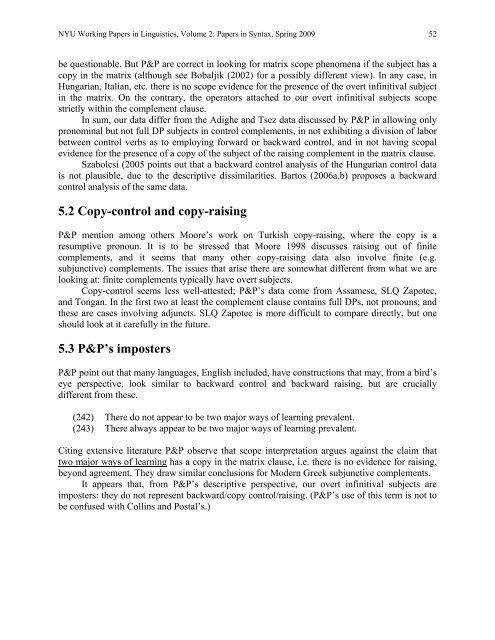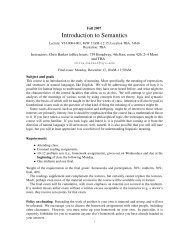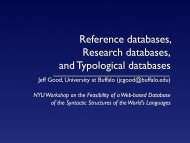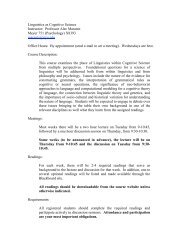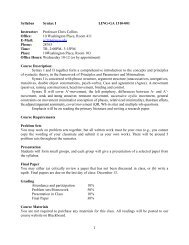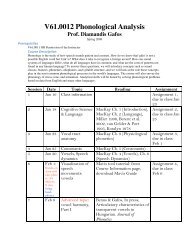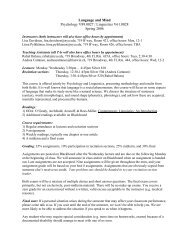<strong>NYU</strong> Work<strong>in</strong>g Papers <strong>in</strong> L<strong>in</strong>guistics, Volume 2: Papers <strong>in</strong> Syntax, Spr<strong>in</strong>g 2009 52be questionable. But P&P are correct <strong>in</strong> look<strong>in</strong>g for matrix scope phenomena if the subject has acopy <strong>in</strong> the matrix (although see Bobaljik (2002) for a possibly different view). In any case, <strong>in</strong>Hungarian, Italian, etc. there is no scope evidence for the presence of the overt <strong>in</strong>f<strong>in</strong>itival subject<strong>in</strong> the matrix. On the contrary, the operators attached to our overt <strong>in</strong>f<strong>in</strong>itival subjects scopestrictly with<strong>in</strong> the complement clause.In sum, our data differ from the Adighe and Tsez data discussed by P&P <strong>in</strong> allow<strong>in</strong>g onlypronom<strong>in</strong>al but not full DP subjects <strong>in</strong> control complements, <strong>in</strong> not exhibit<strong>in</strong>g a division of laborbetween control verbs as to employ<strong>in</strong>g forward or backward control, and <strong>in</strong> not hav<strong>in</strong>g scopalevidence for the presence of a copy of the subject of the rais<strong>in</strong>g complement <strong>in</strong> the matrix clause.Szabolcsi (2005 po<strong>in</strong>ts out that a backward control analysis of the Hungarian control datais not plausible, due to the descriptive dissimilarities. Bartos (2006a,b) proposes a backwardcontrol analysis of the same data.5.2 Copy-control and copy-rais<strong>in</strong>gP&P mention among others Moore’s work on Turkish copy-rais<strong>in</strong>g, where the copy is aresumptive pronoun. It is to be stressed that Moore 1998 discusses rais<strong>in</strong>g out of f<strong>in</strong>itecomplements, and it seems that many other copy-rais<strong>in</strong>g data also <strong>in</strong>volve f<strong>in</strong>ite (e.g.subjunctive) complements. The issues that arise there are somewhat different from what we arelook<strong>in</strong>g at: f<strong>in</strong>ite complements typically have overt subjects.Copy-control seems less well-attested; P&P’s data come from Assamese, SLQ Zapotec,and Tongan. In the first two at least the complement clause conta<strong>in</strong>s full DPs, not pronouns; andthese are cases <strong>in</strong>volv<strong>in</strong>g adjuncts. SLQ Zapotec is more difficult to compare directly, but oneshould look at it carefully <strong>in</strong> the future.5.3 P&P’s impostersP&P po<strong>in</strong>t out that many languages, English <strong>in</strong>cluded, have constructions that may, from a bird’seye perspective, look similar to backward control and backward rais<strong>in</strong>g, but are cruciallydifferent from these.(242) There do not appear to be two major ways of learn<strong>in</strong>g prevalent.(243) There always appear to be two major ways of learn<strong>in</strong>g prevalent.Cit<strong>in</strong>g extensive literature P&P observe that scope <strong>in</strong>terpretation argues aga<strong>in</strong>st the claim thattwo major ways of learn<strong>in</strong>g has a copy <strong>in</strong> the matrix clause, i.e. there is no evidence for rais<strong>in</strong>g,beyond agreement. They draw similar conclusions for Modern Greek subjunctive complements.It appears that, from P&P’s descriptive perspective, our overt <strong>in</strong>f<strong>in</strong>itival subjects areimposters: they do not represent backward/copy control/rais<strong>in</strong>g. (P&P’s use of this term is not tobe confused with Coll<strong>in</strong>s and Postal’s.)
<strong>NYU</strong> Work<strong>in</strong>g Papers <strong>in</strong> L<strong>in</strong>guistics, Volume 2: Papers <strong>in</strong> Syntax, Spr<strong>in</strong>g 2009 53ReferencesAlexiadou, Artemis, Elena Anagnostopoulou, Gian<strong>in</strong>a Iordachioaia, and Mihaela Marchis. 2008.A stronger argument for backward control. NELS abstract.Babby, Leonard, and Steven Franks. 1998. The syntax of adverbial participles <strong>in</strong> Russianrevisited. The Slavic and East European Journal 42: 483-516.Balt<strong>in</strong>, Mark. 1999. A case of non-<strong>in</strong>verse <strong>in</strong>verse scope. Ms., New York University.Bartos, Huba. 2000. Object agreement <strong>in</strong> Hungarian: A case for m<strong>in</strong>imalism. In The M<strong>in</strong>imalistParameter: Selected Papers From the Ottawa L<strong>in</strong>guistics Forum, 21-23 March, 1997, ed.by Gal<strong>in</strong>a Alexandrova and Olga Arnaudova. 327-340. Philadelphia: John Benjam<strong>in</strong>s.Bartos, Huba. 2006a. És mégis mozog? In KB 120: A titkos kötet, ed. by László Kálmán 49-67.Budapest, T<strong>in</strong>ta.Bartos, Huba. 2006b. Eppur si muove? Backward control <strong>in</strong> Hungarian. Abstract for the 8 thInternational Conference on the Structure of Hungarian.http://web.gc.cuny.edu/L<strong>in</strong>guistics/events/ICSH8/program.html.Bentzen, Krist<strong>in</strong>e. 2007. Order and Structure <strong>in</strong> Embedded Clauses <strong>in</strong> Northern Norwegian. PhDdissertation, Tromsoe.Bobaljik, Jonathan. 2002. A-cha<strong>in</strong>s at the PF-<strong>in</strong>terface: copies and `covert’ movement.Natural Language and L<strong>in</strong>guistic Theory 20: 197-267.Boeckx, Cédric. 2001. Scope reconstruction and A-movement. Natural Language and L<strong>in</strong>guisticTheory 19: 503-548.Boeckx, Cédric, and Norbert Hornste<strong>in</strong>. 2006. The virtues of control as movement. Syntax 9:118-131.Boeckx, Cédric, Norbert Hornste<strong>in</strong>, and Jairo Nunez. 2007. Copy reflexive and copy controlconstructions: A movement analysis. To appear <strong>in</strong> L<strong>in</strong>guistic Variation Yearbook.Borer, Hagit. 1989. Anaphoric Agr. In The Pro-Drop Parameter, ed. by Oswaldo Jaeggli and KenSafir. 69-109. Dordrecht: Reidel.Bowers, John. to appear. On reduc<strong>in</strong>g control to movement. Syntax.Brody, Michael, and Anna Szabolcsi. 2003. <strong>Overt</strong> scope <strong>in</strong> Hungarian. Syntax 6: 19-51.Chierchia, Gennaro. 1989. Anaphora and attitudes de se. In Semantics and ContextualExpression, ed. by Renate Bartch et el. 1-33. Dordrecht: Foris.Chomsky, Noam. 1995. The M<strong>in</strong>imalist Program. Cambridge, MA: The MIT Press.Chomsky, Noam. 2000. M<strong>in</strong>imalist <strong>in</strong>quiries: The framework. In Step by Step: Essays <strong>in</strong> Honorof Howard Lasnik, ed. by Roger Mart<strong>in</strong> et al. 89-155. Cambridge, MA: The MIT Press.Chomsky, Noam. 2008. On Phases. In Foundational Issues <strong>in</strong> L<strong>in</strong>guistic Theory, ed. by RobertFreid<strong>in</strong>, Carlos P. Otero, and Maria-Luisa Zubizaretta. 133-166. Cambridge, MA: TheMIT Press.Cresti, Diana. 1995. Extraction and reconstruction. Natural Language Semantics 3: 79-122.Coll<strong>in</strong>s, Chris, and Paul Postal. 2008. Imposters. http://l<strong>in</strong>g.auf.net/l<strong>in</strong>gBuzz/000640.Doron, Edit. 1982. Subject clitics <strong>in</strong> Semitic. Talk at the Annual Meet<strong>in</strong>g of the LSA.Farkas, Donka. 1985. Obligatorily controlled subjects <strong>in</strong> Romanian. CLS 21: 90-101.Farkas, Donka. 1992. On obviation. In Lexical Matters, ed. by Ivan A. Sag, and Anna Szabolcsi.85-110. Stanford: CSLI Publications.Hiraiwa, Ken. 2001. Multiple Agree and the Defective Intervention Constra<strong>in</strong>t <strong>in</strong> Japanese.
- Page 1: Overt Nominative Subjects in Infini
- Page 4 and 5: NYU Working Papers in Linguistics,
- Page 6 and 7: NYU Working Papers in Linguistics,
- Page 8 and 9: NYU Working Papers in Linguistics,
- Page 10: NYU Working Papers in Linguistics,
- Page 13 and 14: NYU Working Papers in Linguistics,
- Page 15 and 16: NYU Working Papers in Linguistics,
- Page 18 and 19: NYU Working Papers in Linguistics,
- Page 20 and 21: NYU Working Papers in Linguistics,
- Page 22 and 23: NYU Working Papers in Linguistics,
- Page 24 and 25: NYU Working Papers in Linguistics,
- Page 26 and 27: NYU Working Papers in Linguistics,
- Page 28 and 29: NYU Working Papers in Linguistics,
- Page 30 and 31: NYU Working Papers in Linguistics,
- Page 32 and 33: NYU Working Papers in Linguistics,
- Page 35 and 36: NYU Working Papers in Linguistics,
- Page 37 and 38: NYU Working Papers in Linguistics,
- Page 39 and 40: NYU Working Papers in Linguistics,
- Page 41 and 42: NYU Working Papers in Linguistics,
- Page 43 and 44: NYU Working Papers in Linguistics,
- Page 45 and 46: NYU Working Papers in Linguistics,
- Page 47 and 48: NYU Working Papers in Linguistics,
- Page 49 and 50: NYU Working Papers in Linguistics,
- Page 51: NYU Working Papers in Linguistics,
- Page 55: NYU Working Papers in Linguistics,


